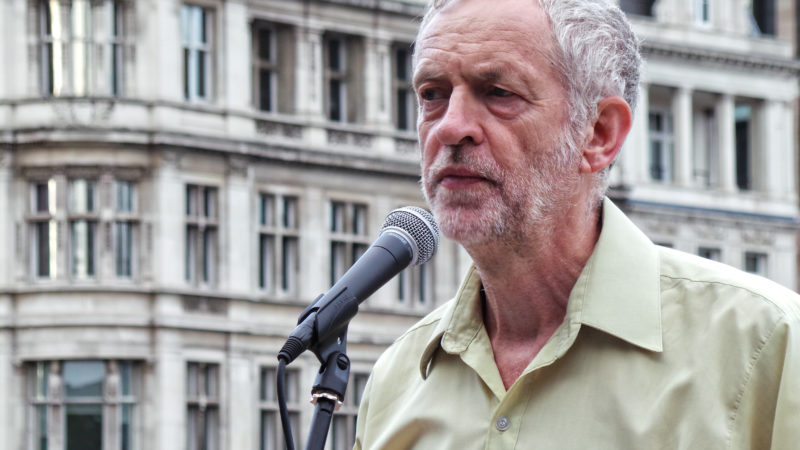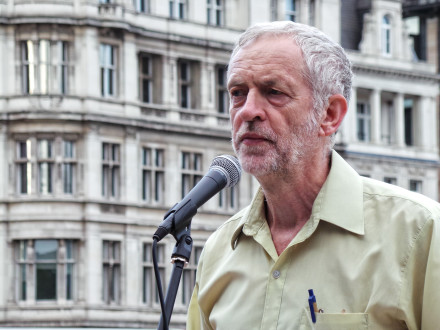

“Don’t follow the crowd,” said former Conservative Prime Minister Margaret Thatcher, “Let the crowd follow you.” Today marks the first 100 days of Jeremy Corbyn’s leadership, and although these two politicians thankfully have little in common, her thoughts on leadership ring true. Masses of people enthused by Corbyn’s politics have flocked to Labour, the party is vocally divided but Jeremy Corbyn is making people think again. His take is to take the electorate with him. The past three months have shown that as some are digging their heels, change is happening.
Taking over the reigns of a party that’s just experienced an unexpected election defeat is no enviable task, not least when you’re an unlikely candidate for leader. It’s hasn’t been an easy ride; within days of Corbyn’s victory so-called Labour “grandees” who are mistakenly seen as rational voices in the party were laying the ground for a coup. The past 100 days have been marked by media hostility – from ludicrous accusations that Corbyn didn’t bow at the cenotaph (when he did) to scaremongering headlines accusing the Islington North MP of posing a threat to Britain – and a rising clamour from an anti-Corbyn section of the Parliamentary Labour Party.
The internecine feuds within the party have certainly captured media attention. And paired with some messaging blunders – Corbyn’s line on shoot-to-kill, for instance, was right but needed to be clearer in the first instance – these issues are stalling party progress on policy. But these happenings are of little interest for people who aren’t drip-fed politics through social media, there is more to Corbyn’s leadership than this.
“Not everything that is faced can be changed”, wrote James Baldwin, “but nothing can be changed until it is faced.” In Corbyn’s first 100 days he has slowly but surely shifted the conversation, while shunning the vacuous personality politics that has seeped into the Commons in recent times. Beginning with a people-powered leadership campaign that exploded into life in the summer months, the former backbench MP has brought ideas that challenge the status quo out from the cold. And though they are still treated with hostility, they are in the mainstream.
Anti-austerity – which was avoided by his predecessor Ed Miliband once he became leader and pursued superficially by SNP leader Nicola Sturgeon – is firmly on the agenda. Doggedly challenging David Cameron on his swingeing tax credit cuts plan, arguably, cleared the way for the House of Lords to challenge the Government and pushed the Chancellor to u-turn yet again. Corbyn has thrown off the robotic politics of recent years, challenged the Tories’ core beliefs and opened the debate by making politics about ideas once again.
The change: a rejection of top-down politics that so many people had grown tired of by the time country dragged itself through the general election. Prime Minister’s Questions has been rejuvenated; the hyper-masculinised back-and-forth bellowing has been traded for calm, measured questions from the public. Hundreds of thousands of people have flocked to Labour since Corbyn became leader. Through e-referendums they could soon debate party policy and consultation on upcoming votes might also be commonplace: Corbyn is making sure members are heard.
The status quo is now up for debate. Corbyn, a lifelong anti-war campaigner, seriously challenged the consensus on bombing ISIS in Syria. He may not have got all of the PLP on side, with 66 MPs voting with the Government in a free Labour vote but fundamentally, he made Britain’s hypocritical foreign policy visible. While, Corbyn forced the Government’s hand on the prison deal with Saudi Arabia – a country Britain holds close through corrupt agreements despite its morally reprehensible policies – by highlighting the overwhelming duplicity of this plan at a Labour party conference that passed without the disastrous fallout many said would take centre stage.
The Corbyn brand was long predicted as lethal by commentators and politicians alike, but it didn’t appear at the ballot box in Oldham. With Corbyn at the helm and all parts of the party descending on the constituency to knock on doors, Labour held off an aggressive Ukip campaign and won with a huge victory foreseen by few. The party, it turns out, is electable under this new, honest-speaking leader: it was a “vote of confidence”.
But as the year comes to a close and Corbyn takes the first steps into his next hundred days as leader, the challenges are huge. And they are many. As social democratic parties all over Europe lose votes, Labour face a public discontented with the party and party politics on numerous fronts. As the May elections approach, the issues of Scotland, UKIP, the Tories and non-voters rear their heads once again.
The party must stop warring with itself because its biggest challenge should be undermining the Tories, not its own leader. While disagreement is expected and debate welcomed, certain portions of the PLP needs to realise the huge mandate the party membership gave to their leader.
To take on their real foe, the leadership need to have the space to create policies – not least on immigration, an issue that can’t be avoided – and to develop a relatable narrative. Jeremy Corbyn must do what the Tories only do superficially: he must speak for Britain. And while he can’t win over a hostile media in its entirety, well-delivered TV appearances (like Corbyn’s interview on Andrew Marr) are essential.
But national messages only get so far. Oldham West was a reminder that despite the braying at a national level, politics is local, too. The grassroots movement should be the lifeblood of Labour’s future; getting into communities is the best way to do politics. But organisation and unity is paramount, the structure of movements like Momentum needs to be clear, fair, representative and ultimately horizontal.
Marred by infighting but uplifted by Corbyn’s dignified style of politics the past 100 days haven’t been without bumps in the road and some unforced errors. There is much to be done in the months and years ahead but for all intents and purposes Corbyn is doing what he was elected to do: changing the state of British politics and moulding Labour into a real alternative.




More from LabourList
‘SEND reforms are a crucial test of the opportunity mission’
Delivering in Government: your weekly round up of good news Labour stories
Labour place third in Gorton and Denton by-election as Greens gain seat